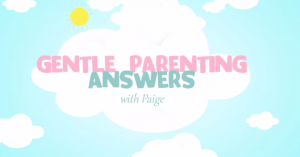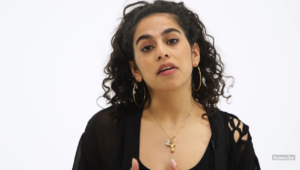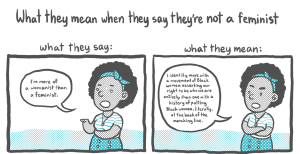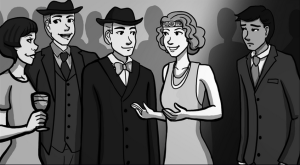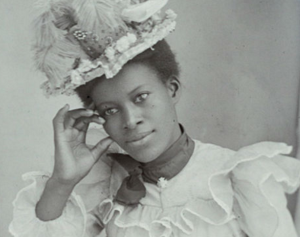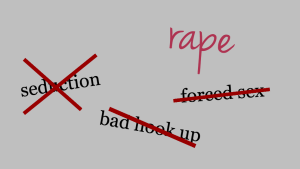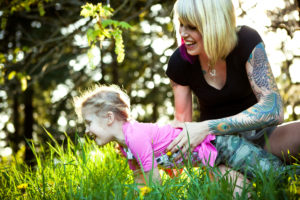
A parent with a full sleeve tattoo enjoys a day in the park with their child, who crawls through the tall grass.
I want my kids to do better than me.
I said a lot of terrible things growing up, thinking I was being funny. And in retrospect, I know I made life harder for others, as well as reinforced dominant narratives about race, gender, and sexuality.
I wholeheartedly believed that I was a “good person” who would never actively hurt anyone.
However, I was a bully with my jokes. I made derogatory comments about people and places I didn’t understand. I thought that if I didn’t find it offensive, then why would anyone else?
I was raised in a world where if you worked hard and did your best, then the sky was the limit – in theory. The word privilege to me meant you had money, not an advantage that others may not have.
In fact, the definition of privilege is that everyone can’t have it, or else it’s not privilege — and that includes being treated with respect and dignity.
I was taught, on the other hand, that we lived in a world filled with stairs and broken footpaths that people with limited mobility were just meant to cope with. Oppression means that aspects of your life are harder than they have to be, due to choices that people have made in the way our society has been and is currently running.
I’m raising three girls (as far as I know), and I’m trying my best to raise them to be compassionate, tenacious, problem-solving people who have oodles of self-esteem, vast imaginations, and who actively want to make the world a better place.
Why? Because I honestly believe that if people truly understood the impact of what they said and did, then we could solve a great many of the world’s problems.
The vast majority of terrible things that people are forced to deal with on a day-to-day basis were created by people, perpetuated by people, and taught to kids as the status quo.
People came up with the concepts of racism, sexism, ableism, and other oppressions – so people can dismantle those concepts, too.
There is nothing innate about privilege and oppression. We teach our kids about how to fit into society as it currently stands. And our current society is flawed AF!
This doesn’t have to be the world we live in, or the world our kids have to get used to. Change can happen.
However, one of the first things that needs to happen is for people who presently benefit from the way society is set up (myself and my kids included) to see that they are benefiting from this system and put the work in to changing the way our society works – even if that makes them uncomfortable and leads them to lose some of the perks they may have become accustomed to.
For some context, my kids currently are five and twin two-year-olds. The two-year-olds get a very abbreviated version of my parenting style. Mostly: “Here are your choices, A or B,” “How are you feeling,” “What do you need?” and “This is what’s happening and why it is happening.”
My five-year-old gets the expanded version. We talk a lot about why we do things the way we do in our house, so that she understands the reasons behind the choices we make and the rules we have.
We talk about consequences and empathy because we want her to learn that her words and actions have repercussions. Other people can be hurt by something she says or does, even though what she said or did means very little to her.
Many people parenting nowadays using a feminist lens understand that how we talk to our kids is important. Here is my personal cheat sheet of intersectional parenting tips.
1. Practice Informed Consent
Tell your child they own their own body – no one is allowed to touch them without their informed consent.
No hugs for relatives, no sitting on Santa’s lap, no kisses for mummy unless they understand what is being asked of them and they want to do it (not just doing it for the sake of being polite).
We talk about informed consent because asking “Do you want to be tickled?” isn’t enough for me as a former sexual violence prevention educator. We get really specific in our house, and we check in a lot.
Tickling another person is great, as long as everyone involved knows exactly where the tickling is happening, is keen on that tickling, and is given every opportunity to stop the tickling if it stops being enjoyable.
I relate informed consent a lot to food. For me, to choose what I’m going to eat, I need to know what it is and I need to know that I can stop when I’ve had my fill.
2. Praise Your Child for Listening to Their Body
Don’t force them to eat everything on their plate, and remember that them needing to go to the bathroom as you leave the house, or saying they’re not cold and don’t need a jacket, are all examples of kids listening to their bodies.
That might be frustrating as a parent, but we should still do our best to respect that.
I want my girls to know that they are in charge when it comes to their bodies.
I find the concept of bodily autonomy (as I view it) can easily go hand-in-hand with normalizing ableism. Saying “this is your body – you can choose who touches it, and you get to choose what you do with it” means we leave out those who don’t get that choice.
This can often lead to people with disabilities being seen as “teachable moments,” which is never okay. If people do need help, that doesn’t diminish the fact that they, too, have bodily autonomy and their body is theirs, too, even if they require assistance with things that others take for granted.
However, trying to create resilience in my kids around bodily autonomy without acknowledging the ever-present ableism in that concept is something I struggle with and I still am not sure how to include it in a meaningful way.
But I will keep trying.
3. Rejoice in the Innate Beauty of Your World
This includes your own beauty and that of your child – finding beauty, joy, and wonder in all things. The more you look for beauty, the more you’ll see.
Talk about wondrous things. Life is amazing, adaptive, and yet so fragile.
In our family, we actively spend time looking for and talking about all the awe-inspiring aspects of life. From discussing the amazing things people have done (like Kate Sheppard, Malala Yousafzai, Carmen Rupe, Rosalind Franklin, and Harriet Tubman – just to name a few) to looking at the majesty of nature and the vast unknown of space.
No matter how terrible life is right now, you are alive – and that in and of itself is kind of miraculous.
It is a radical act to celebrate and actively search for non-conforming beauty in ourselves and others. The more we can see the world as filled with diverse forms of beauty, the less we can be told that there is just one standard of beauty to aspire to.
4. Talk About Love
Love is a hard concept to grasp. People do all manner of things “in the name of love,” and I want my girls to know what love looks, feels, and sounds like so they’ll know when someone is just throwing around the word love for their own gain.
We operate under the “platinum rule” in our house (credit to Sam Killermann for this concept), which says that we do unto others as they wish to be done unto them.
That means that although I might want to show my love for my daughters by giving them a big hug, it’s more loving (and respectful of their autonomy) to ask them if they would like a hug and then give them time to think if it is something they actually want.
My desire for a hug is not the only important thing to consider. Showing love is about respecting boundaries and giving my kids the knowledge that the most loving thing to do is clearly (and without malice or entitlement) asking for what you want, giving the other person time to think about your request, and then respecting their decision, regardless of if that was the outcome you wanted.
5. Celebrate the Changes Your Child Goes Through
Change is hard. Growing can be painful.
Respect their hardship and their pain. Acknowledge how everything changes – and talk about it.
The unknown can be terrifying, and discussing how things change can help prepare kids for their bodies and minds to grow, with the knowledge that everyone experiences change differently.
There is no “normal,” just a sliding scale of how frequently others experience the same things as you.
6. Avoid Focusing Praise Solely on Physical Appearance
Praise focused mainly on physical appearance can lead to people thinking that the only thing of value, or the only thing that matters about themselves, is their appearance.
At the same time, focusing praise on winning or being the best can lead to massive anxiety around achievement (or failure), and focusing praise on what your body can do risks normalizing ableism.
The key here is that we are all just temporarily able bodied people. Everyone will experience some sort of change in how their body functions (aging, illness, injury). And if the main message that you received about your body is praise for what it can do, then as soon as your abilities change, it can lead to feelings of frustration and loss.
Relying on the phrase “at least you’ve got your health” can inspire a mindset where without health – whether through illness, age or accident – a person finds themselves thinking they no longer have anything of worth.
Think about the rhetoric this phrase and others like it create – the only time you can enjoy yourself, or the only thing that is important is being “healthy,” but what is “health?”
What about people with chronic illness? What does this phrase say about the quality of their life?
This isn’t to say that you can’t praise your kids! Focusing praise on tenacity, problem solving, empathy, and the ability to ask for help when they need it are more useful life skills.
Notice when they’re being tenacious and praise them for sticking to what they are doing. Tell them you love how they solved the problem at hand. Point out when they are being empathetic and tell them how proud you are of the choice they made.
When they want your help, let them know you’re proud that they knew to ask for it.
7. Apologize By Saying More than Just ‘Sorry’
To do it right, you have to truly understand what you did wrong, feel remorse, and change so it doesn’t happen again. After that, you check in with the person you’re apologizing to so you can see if there is anything you can do now to address any damage you’ve done.
Apologizing is a life skill that we should all be more mindful of practicing. Imagine a world where you could call someone out for bigotry and that was their reaction, rather than the classic non-apology of “I’m sorry you were offended.”
Remember to mirror this back to your kids. If you want them to learn how to apologize properly, then you will have to model it to them.
8. Talk About the Terrible Things in the World
War, slavery, and corruption are all topics of conversation I’ve discussed with my five-year-old. Why? Because it is contextually important and sadly still relevant to our day-to-day life.
We watched the Disney/Pixar DVD with Frozen Fever on it, and the first short film up was John Henry. As a story about an African American folk hero, it got us started on talking about slavery.
We don’t idly consume media in our house.
If the book, movie or song is about a concept, person, or event that my daughter doesn’t understand yet, then we unpack it. Which can be a brutal process.
Trying to explain the concept of slavery to a five-year-old is no easy task. However, it needed to be done so that she could understand the context of the film (and the world she lives in).
9. Talk About Breaking the Rules and How Life Isn’t Fair
We talk about how we have rules inside our house and how other people have other rules.
We talk about how some rules can change (you take your shoes off before entering our house, but not everyone has that rule) and others are rules that will never change no matter where you are or what anyone says (no one can ever kiss you without your informed consent).
We talk about how rules and adults are (in theory) meant to help and protect us, but not all people and rules do that.
So we talk about the core values that no rule or person is allowed to break:
- You need to know what’s going on
- You need to have time to process any request
- You need to be safe
- When you say “no” or “stop,” people need to do as you ask
By far the hardest thing to age appropriately unpack are these last three concepts with my daughter:
- Not all people who should help you will help you
- Not all rules are meant to keep you safe
- Not all people will get the same repercussions for the same behavior
So this leaves me in the uncomfortable position of having to explain the world to my children with caveats.
“Do what your teacher says, unless…” “Listen to your grandparents, except…” “Police are there to help you, but…”
In the end, though, that’s what it’s like parenting with privilege. It’s uncomfortable. If you are unpacking the privilege you and your kids hold it will be uncomfortable, and that’s okay.
I want my girls to know what is expected of them and why those expectations are there. The next step is for them to have the freedom to figure out if they want to adhere to those expectations and rules.
Lastly, they need to know that the mere fact that they can “break the rules” without dire consequences is in itself a privilege, and often the missing piece that I see many feminist parents of privilege overlooking.
Explaining the fact that some people will experience truly terrible things for behaving the exact same way as my girls is heartbreaking, but it still beats the hell out of having to live with the oppressive forces that so many others do.
So until we have dismantled the flaws in ourselves and our society that perpetuates power and privilege – and by extension, oppression – then I’m prepared to deal with the uncomfortableness of explaining this shit to my kids.
***
Although I can write my parenting style down, that does not mean I get it “right.” Every day, I “fail” in one way or another when trying to unpack the world with my kids. But every day, I learn more about my girls, and about me as a parent, and I try again.
I’m doing the best I can – and similarly, that’s all I can ask of you.
Our kids will shape our society, so let’s raise people who are better than we are, people who will call us on our BS.
And when they do, let’s listen to what they say.
[do_widget id=’text-101′]
Rebecca Leys is a health promoter and a stay at home mum of three precocious girls living in Aotearoa. Her focus is on unpacking privilege as a parent, positive body image, sex, and dismantling rape culture. She loves tattoos, cooking, and playing board games.
Search our 3000+ articles!
Read our articles about:
Our online racial justice training
Used by hundreds of universities, non-profits, and businesses.
Click to learn more






